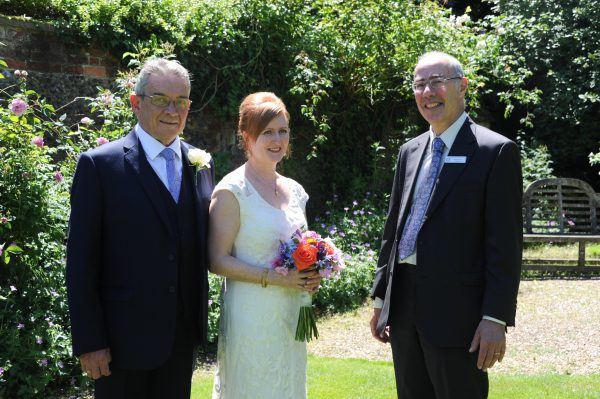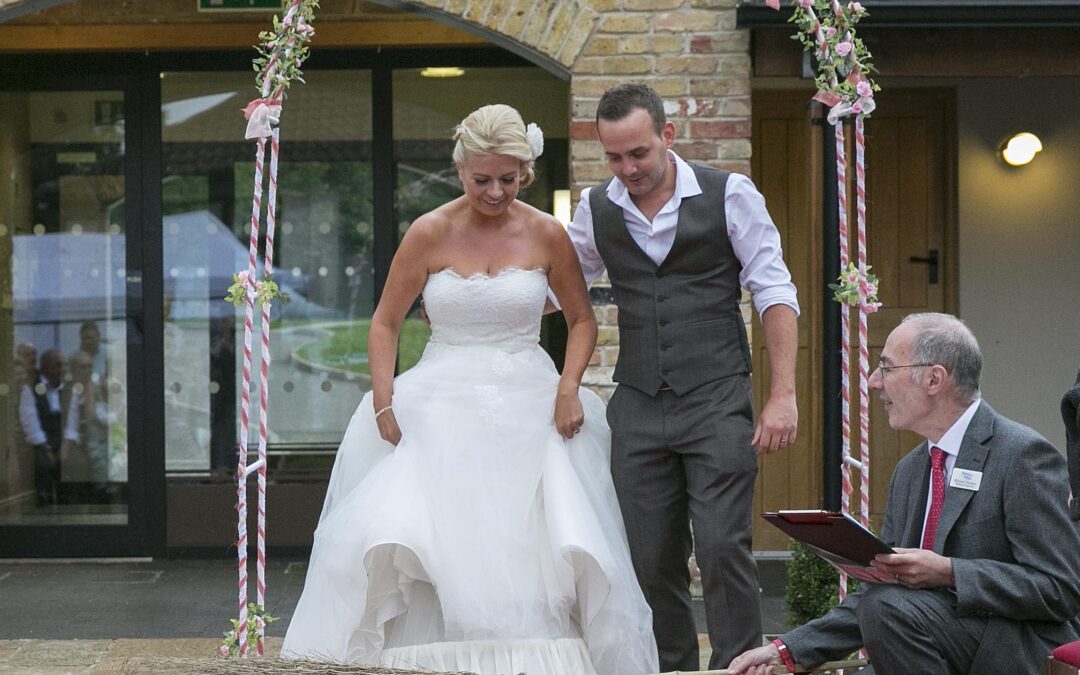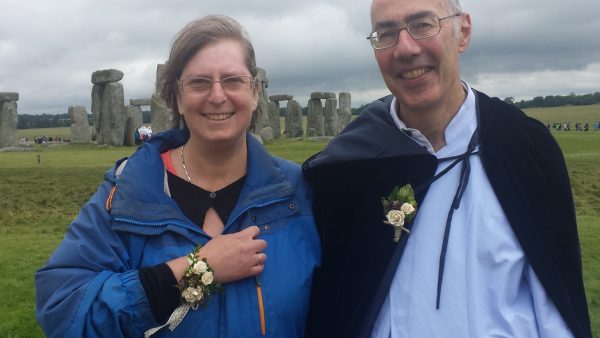
by Michael | Apr 11, 2022 | Blog
It’s understandable that I get asked what a civil celebrant actually is. I hope this blog will give you answers and paint a clearer picture, so you can see the potential benefits of working with one.
Here are a few questions I get all the time.
Are you a Humanist?
The short answer is “no”, but, in fact, I am much more than that. A Humanist is not supposed to include religious elements (or even the word “God”) in their service. However, if you want a secular service, you don’t need to resort to Humanists.
A civil celebrant can conduct a non-religious ceremony (as well as a part-religious or mixed-faith one). So that’s simple enough.
How much contact time is there between myself and officiant?
You will only meet the registrars for the first time at the marriage ceremony. The same may go for your vicar, if you’re having a church service. That’s not normally the case with a civil celebrant.
Apart from an introductory, discovery call (or visit) after your initial contact, you have access to your celebrant at all reasonable times from the time of booking until the day of the ceremony. So if you have queries or issues, it is easy to resolve them and you will feel more relaxed on the day because you will have established a close relationship with your celebrant.
How much control do I have over what goes into the service?
Only if you are working with a civil celebrant will you get free choice. Of course, you will also get guidance and advice, if wanted. Your ceremony will not be not standard or pre-ordained. You can have your own readings, vows or rituals – anything to make your ceremony personal and unique.
A church service is set in stone and the registrars offer a standard service, although sometimes they offer a modicum of choice.
So the content is basically unrestricted, if you work with a civil celebrant.
What about location and timing?
The church or Register Office ceremony is normally limited to “office hours”. A civil celebrant has no restrictions on when the ceremony can take place.
Likewise, with the location. A civil celebrant will conduct a ceremony for you almost literally anywhere. That’s clearly not the case with church weddings, and there are conditions to be complied with, in the case of Register Office services.
Hopefully, this will have clarified things a lot, but if you have further questions, please feel free to ask me!

by Michael | Oct 4, 2021 | Blog
Most people don’t really know what a civil celebrant can offer or why they should investigate using one.
A fallacy is that a celebrant is the same as a registrar. Although a proposal to change things so a celebrant’s ceremony can be legal too is going through parliament at present, the roles are still separate.
A registrar is a civil servant, who is employed by the government to ensure that all the legal bits are carried out to make each marriage valid. Their ceremony normally takes a quarter of an hour or so, and is standardised. So each couple gets more or less the same as the one before, or the next one. What’s more, the service may not contain a single religious word or even mention God.
Given that the registrar’s ceremony is mandatory, why should you bother with a celebrant ceremony too?
The fact that the celebrant is independent is worth a great deal. It means that, once you have been legally married (by the registrar), you are free to have the ceremony of your dreams in the place of your dreams.
If you want some religious items, you can do so; if you want to write your own vows, you are welcome to; if you want a mention of absent friends, not an issue; if you want to talk about how the two of you met – or what is keeping you together – then that’s great!
You can have a mix of solemnity and humour. You can have a unique ceremony, maybe including a ritual or two (such as the Loving Cup or a handfasting), and you can tailor your ceremony so that others can participate.
In short, the ceremony can reflect your personalities and beliefs, and be everything you want it to be.
But only with a celebrant.
Of course, there are many celebrants out there, and each has their own USP. So you need to speak to, if not meet, one or two (eliminating some, once you’ve looked at their websites).
Online reviews are a good starting point. Then you can see if the celebrant is likely to understand and run with your vision of the ceremony.
Your budget is not as important as feeling the person is right for you. (You can usually tinker a bit and save some money elsewhere, if the celebrant is a bit dearer than you had planned.)
As well as showing professionalism, albeit in a likeable way, the celebrant should have great presentation skills.
They should be able to create a wonderful personalised ceremony that is beautifully delivered on the day. They need to be able to work hand-in-hand with you to achieve this.
Michael would be glad to have a (non-obligation) call with you to discuss how he can help guide you to your dream ceremony.
Photo: Soody Ahmed

by Michael | Jun 25, 2018 | Blog
The proposal is over and done with. You’re engaged! What an exciting time! Congratulations!
Of course, this is a wonderful period. You’re walking on air. But maybe I can bring you down to earth just a little. There are some questions you need to consider.
Are you going to name the day now? What sort of ceremony will you have? What about the reception? Where will it be? Who will you invite?
And so it goes on …
That’s reality, I’m afraid!
First things first
If you’re opting for a full-religious ceremony, then your church/synagogue/mosque etc. will give you the information you will need.
If you’re not so sure you want to go down this route, then it’s worth reading on. Because you do have choices.
Options
There’s a register office wedding. That covers the legal bits. However, the ceremony is, frankly, not particularly special. The service (apart from the names used) will be the same from one couple to the next. You can feel part of a ‘conveyor-belt’.
Better than this is what a civil celebrant offers. He will create and conduct a tailor-made ceremony for you. You’ll still need to go to the register office with two witnesses to get the legal bits done before the civil ceremony. (This can happen the morning before, or a couple of days before.)
If you prefer, and you’re using a licensed premises, the registrars can be booked. They’ll come along, and, as soon as they have legally married you, you can proceed with the (celebrant-led) ceremony of your choice.
Advantages
One advantage of a civil ceremony is that you can have a service that is as religious – or not – as you want. Or – and this is great for people who are not marrying someone of the same faith – you can have a mixed religious ceremony. So, for example, I’ve been able to marry a Jew and a Christian, a Jewess and a Muslim and even a half-Jew and a pagan. We’ve been able to incorporate elements from both cultures each time, so everyone was happy.
The full-religious and, indeed, the Register Office, ceremonies follow a set pattern. However, with a (bespoke) celebrant-led ceremony, you can set your individual stamp on the proceedings.
Following a chat with your celebrant, who can suggest to you what is possible and guide you, you can work out a ceremony that reflects your personalities and beliefs, and will be everything you want it to be.
That means you have input into, and editorial control over, everything. You decide on the texts/poems/reading, reciting of vows, who actually participates, music, rituals etc. That’s what I mean by “tailor-made”. The ceremony will be unique: unforgettable for you and your guests; relevant and meaningful.
I can gladly give you more information. Just call or e-mail. This can be an excellent starting point for you, now that you’re engaged. Let me help you successfully tread the exhilarating road that leads to marriage.



